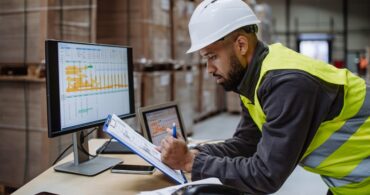A job of a forklift operator is an important responsibility that requires a skilled driver. Here’s a detailed look at the duties and requirements necessary for a forklift driver job description.
From construction sites to warehouses, a wide variety of locations and industries require forklifts in their day-to-day operations. This diversity of worksites means that the requirements for specific forklift driver positions vary from job to job. However, some forklift operator duties remain consistent across the board.
For anyone interested in earning a forklift certification or creating a forklift operator job description, this article details all of a forklift jobs’ responsibilities and requirements.
What is a forklift operator job description?
Likely, you won’t be too surprised to discover that a forklift operator is responsible for driving a forklift and safely transferring cargo from one location to another, such as from a delivery truck to a storage location. However, a forklift driver has many more responsibilities than merely hopping in a lift and tooling around. For example, maintaining a safe workspace is an essential component of the role. Also, part of the forklift operator job description is to maintain a forklift maintenance checklist, look for vehicle damage, and perform regular maintenance in addition to noting product quality deficiencies and reporting any shortages.
Forklifts are heavy industrial equipment, which means that the job of forklift operator requires skilled labor. A forklift driver must know how to manage the vehicle, spot potential safety issues, and react quickly to prevent them. So, an operator needs to be alert at all times. Additionally, even though the forklift does most of the heavy lifting, operators must be physically fit.
In general, a forklift operator job summary includes these responsibilities:
- Operate and manage technical industrial equipment.
- Be aware of other people, employees or otherwise, in the work area.
- Analyze production schedules to determine movement and prepare for deliveries.
- Adhere to production schedules.
- Consult and coordinate with your manager and other employees regarding production schedules.
- Attend meetings with the manager and coworkers.
- Load, unload, ship, and receive warehouse items.
- Unload merchandise from incoming vehicles and transport them to assigned spots.
- Shrink wrap merchandise and get it ready to ship.
- Load merchandise on pallets to prepare for shipping.
- Transport merchandise to different areas in a warehouse.
- Rotate stock in “first in, first out” order, so the oldest products leave first.
- Safely organize and secure boxes, bales, pallets, etc.
- Check-in merchandise.
- Approve new shipments
- Pick orders from inventory using a pick sheet.
- Prepare, present, and approve bills of lading.
- Weigh products and loads and record the results.
- Optimize loads to ensure safety and efficiency.
- Secure loads to the machine before transportation.
- Move hazardous materials.
- Transport raw materials to production sites.
- Perform quality checks to identify damages, shortages, and defects.
- Maintain equipment by cleaning, oiling, recharging batteries, refueling, etc.
- Routinely inspect vehicles.
- Schedule vehicles for maintenance and repairs.
- Perform regular maintenance.
- Use radio frequency scanning equipment to manage inventory.
- Keep activity logs and inventory records up to date.
- Help maintain a safe and orderly environment.
- Comply with OSHA standards.
- Identify and report faulty equipment or other potential safety hazards.
- Comply with company policies and legal guidelines.
- Adhere to uniform requirements.
- Keep the work area clean.
- Attain a forklift certification.
- Attend certification refresher classes.
- Must be at least 18 years old.
Again, this list—while admittedly comprehensive—only contains possible job requirements. An actual forklift operator job description may include fewer or more requirements based on the specific role and worksite location.
Forklift operator description
At a worksite, situational awareness is essential. So, a forklift operator must have exceptional hand-eye coordination. A forklift driver often operates in a loud, busy, and potentially dangerous warehouse and construction environments. In addition, the operator— and other employees—regularly wear ear protection. So, because hearing may be impaired, it’s essential to know what’s going on at all times. Operators also need to learn the OSHA-approved hand signals to communicate nonverbally with other employees and maintain a safe workspace.
Some necessary skills listed in a forklift job description may include:
- High school diploma, GED, or equivalent work experience.
- Detailed oriented.
- Able to safely operate a forklift and other material handling equipment.
- Must obtain and maintain valid forklift certification.
- Comfortable working in a fast-paced environment.
- Works well without direct supervision.
- Basic reading, writing, and arithmetic.
- Must understand how to perform the job safely.
- Able to work all overtime hours.
- Previous manufacturing or distribution experience preferred.
- Computer skills.
As always, the full range of skills listed in a forklift operator job description depends on the location of the work and the specific role. However, there are always three guaranteed aspects of a forklift operator job:
- You must know how to operate a forklift.
- You must be certified to operate a forklift.
- You must understand workplace safety and comply with all regulations.
At Texas Motive Solutions, we help Texas warehouse operators keep their forklift fleets running efficiently and on schedule and can train your forklift operator on proper forklift battery care. If you have any questions about forklift batteries and accessories options, give us a call at (888) 316-2459 or fill out a form to learn more about our services.



